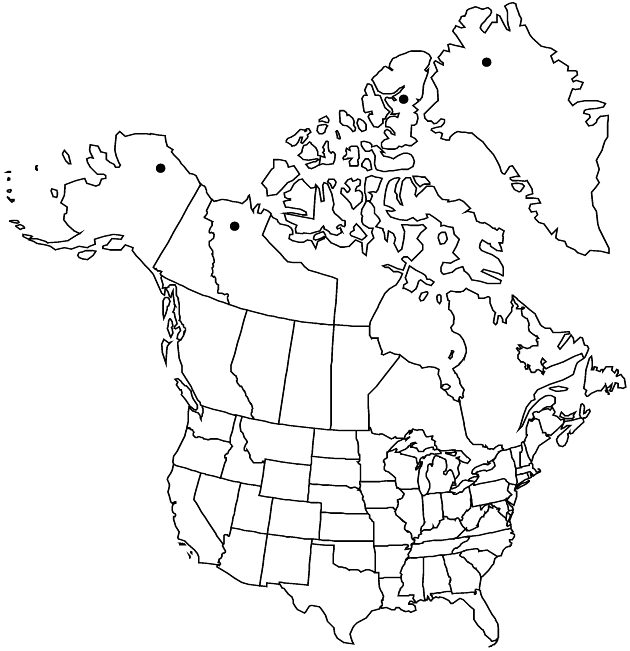Difference between revisions of "Taraxacum hyparcticum"
Ark. Bot. 4(8): 17, fig. 3. 1905.
FNA>Volume Importer |
imported>Volume Importer |
||
| (6 intermediate revisions by 2 users not shown) | |||
| Line 24: | Line 24: | ||
|elevation=20–1010 m | |elevation=20–1010 m | ||
|distribution=Greenland;N.W.T.;Nunavut;Alaska;Eurasia. | |distribution=Greenland;N.W.T.;Nunavut;Alaska;Eurasia. | ||
| − | |discussion=<p>Taraxacum hyparcticum is sporadic in Arctic Eurasia (coastal Russia from Russian Far East west to Novaya Zemlya); it is mainly high-arctic. It is characterized by its small stature and large heads with white to yellowish cream ligules.</p> | + | |discussion=<p><i>Taraxacum hyparcticum</i> is sporadic in Arctic Eurasia (coastal Russia from Russian Far East west to Novaya Zemlya); it is mainly high-arctic. It is characterized by its small stature and large heads with white to yellowish cream ligules.</p> |
|tables= | |tables= | ||
|references= | |references= | ||
| Line 33: | Line 33: | ||
-->{{#Taxon: | -->{{#Taxon: | ||
name=Taraxacum hyparcticum | name=Taraxacum hyparcticum | ||
| − | |||
|authority=Dahlstedt | |authority=Dahlstedt | ||
|rank=species | |rank=species | ||
| Line 48: | Line 47: | ||
|publication year=1905 | |publication year=1905 | ||
|special status= | |special status= | ||
| − | |source xml=https:// | + | |source xml=https://bitbucket.org/aafc-mbb/fna-data-curation/src/2e0870ddd59836b60bcf96646a41e87ea5a5943a/coarse_grained_fna_xml/V19-20-21/V19_327.xml |
|tribe=Asteraceae tribe Cichorieae | |tribe=Asteraceae tribe Cichorieae | ||
|genus=Taraxacum | |genus=Taraxacum | ||
Latest revision as of 20:51, 5 November 2020
Plants (3–)5–12(–30) cm; taproots occasionally branched. Stems 1–5, ascending to erect, pinkish to reddish or purplish, (barely exceeding foliage), glabrous or glabrate (rarely sparsely villous and villous distally). Leaves fewer than 10, usually patent, rarely erect; petioles sometimes narrowly winged; blades oblanceolate (often ± runcinate), 2–12+ × (0.3–)0.5–1.2 cm, bases attenuate, margins lobed deeply and regularly to denticulate or subentire, lobes 5–6 pairs, straight to retrorse, triangular to deltate, teeth triangular 0–1 on lobes or 1–4 shallow pairs if subentire, acute to ± obtuse, apices obtuse to ± acute, faces glabrous. Calyculi of 10–14, spreading to appressed (thinner than phyllaries), dark green, broadly ovate or ovate to oblong bractlets in 2–3 series, 6–10 × 3.4–5 mm, margins narrowly hyaline, scarious, apices abruptly acuminate to caudate, strongly horned, tip ± scarious, erose. Involucres dark green to bluish black or dark purplish green, narrowly campanulate, 15–30 mm. Phyllaries 8–14 in 2 series, lanceolate to lance-ovate, 1.5–3.5 mm wide, margins narrowly (outer) to widely scarious in proximal 1/3 (inner), narrowly so distally, apices long-acuminate, sometimes callous, hornless (rarely very small horns), tips white-scarious, erose, rounded. Florets 25–50; corollas cream-colored to white or pink-tinged distally, outer pinkish-striped abaxially, 15–20 × 1.2–3 mm. Cypselae tan or straw-colored to brown (or reddish brown), sometimes grayish, bodies obovoid to oblanceoloid, 3–3.7(–4) mm, mostly broad, cones conic, 0.4–0.7 mm, beaks slender, 3.5–4.5 mm, ribs 10–13 (5–6 prominent), mostly broad, faces proximally tuberculate, muricate in distal 1/2; pappi whitish or sordid, 5–5.5(–7) mm. 2n = [24, 32, 40? some erroneous reports in literature under this name from Eurasia].
Phenology: Flowering summer.
Habitat: Dry, moderately drained areas in tundra, raised sand terraces, low center polygons on old surfaces, sandy, eroded knolls, marine/lacustrine deposits, rocky streambeds, dry slopes
Elevation: 20–1010 m
Distribution

Greenland, N.W.T., Nunavut, Alaska, Eurasia.
Discussion
Taraxacum hyparcticum is sporadic in Arctic Eurasia (coastal Russia from Russian Far East west to Novaya Zemlya); it is mainly high-arctic. It is characterized by its small stature and large heads with white to yellowish cream ligules.
Selected References
None.